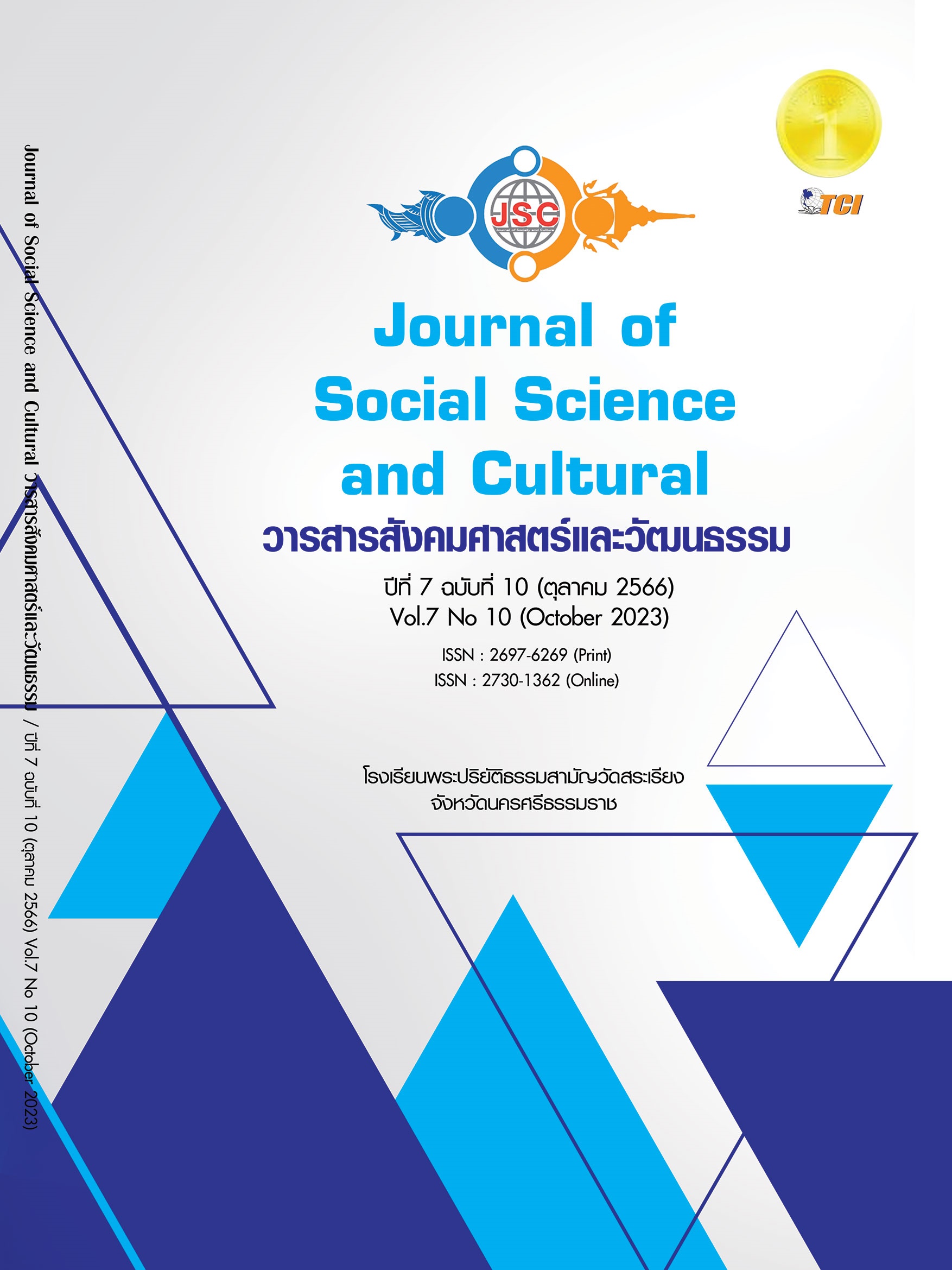THE DEVELOPMENT OF A MODEL THAT PROMOTES PROACTIVE LEARNING MANAGEMENT BEHAVIOR AMONG TEACHERS AT MUNICIPAL SCHOOL 1 (BAN KAO) IN PHAN DISTRICT, CHIANG RAI PROVINCE
Main Article Content
Abstract
The primary objectives of this research article are as follows: 1) The objective of this study is to investigate fundamental data in order to construct a model that facilitates the promotion of proactive learning management behaviors among teachers. 2) The aim of this research is to construct a comprehensive model that effectively promotes proactive learning management behaviors among teachers. 3) This study seeks to analyze the outcomes of implementing the aforementioned model for promoting proactive learning management behaviors among teachers. 4) The purpose of this evaluation is to assess the effectiveness of the model in promoting proactive learning management behaviors among teachers. Using the research and development method, there are four research steps: 1) Investigation of fundamental data for the development of a model: Data was gathered from a cohort comprising six academic administrators, twenty - two teachers, and two school directors. 2) Model development: Data was collected from a sample of nine individuals who met the criteria for qualification. 3) Analysis of model implementation outcomes: A sample of twenty - two teachers was utilized to gather data. 4) Model assessment: The data was obtained through the participation of two school directors, twenty - two teachers, fifteen members of the basic education committee, and ninety parents. The study utilized various research instruments, such as interviews, questionnaires, assessments, and statistical analyses, including measures of central tendency (means) and variability (standard deviations). The research findings can be summarized as follows: 1) The analysis of fundamental data revealed that teachers exhibit a moderate level of proactive learning management behaviors ( = 3.12, S.D. = 0.79). These behaviors can be fostered through three key dimensions: the design of learning activities, the management of learning processes, and the evaluation of learning outcomes. 2) The model that has been developed consists of six distinct components: principles, objectives, content, processes, assessment, and success factors. It is worth noting that this model is deemed highly suitable for the intended purpose. 3) The implementation of the model resulted in a notable enhancement of teachers' proactive learning management behaviors. 4) The evaluation of the model's impact revealed a significant degree of efficacy. The elements that exhibit the greatest efficacy are the advantages and practicability.
Article Details
References
ดลพร เพ็ญไพบูลย์เสถียร. (2561). การพัฒนาทักษะการคิดแก้ปัญหาด้วยการศึกษาชั้นเรียน (Lesson Study) โดยวิธีการสอนแบบเปิด (Open Approach) ร่วมกับการใช้กรณีตัวอย่าง (Case Stydy Techniques). ใน วิทยานิพนธ์ศึกษาศาสตรมหาบัณฑิต สาขาวิชาหลักสูตรและการสอน. มหาวิทยาลัยขอนแก่น.
ทัศนีย์ บุญแรง. (2561). การพัฒนาครูในการจัดกิจกรรมพัฒนาผู้เรียนเพื่อส่งเสริมทักษะการคิดวิเคราะห์โดยใช้ภูมิปัญญาท้องถิ่น. เชียงใหม่: มหาวิทยาลัยราชภัฏเชียงใหม่.
ทิศนา แขมมณี. (2557). ศาสตร์การสอน: องค์ความรู้เพื่อการจัดกระบวนการเรียนรู้. กรุงเทพมหานคร: จุฬาลงกรณ์มหาวิทยาลัย.
นนทลี พรธาดาวิทย์. (2561). การจัดการเรียนรู้แบบ Active Learning. (พิมพ์ครั้งที่ 2). กรุงเทพมหานคร: ทริปเพิ้ล เอ็ดดูเคชั่น.
บุญชม ศรีสะอาด. (2559). การพัฒนาการวิจัยโดยใช้รูปแบบ. เรียกใช้เมื่อ 25 สิงหาคม 2564 จาก https: //www.kroobannok.com/news_file/p61238851032.pdf
พิกุล เอกวรางกูร และคณะ. (2558). แนวทางการส่งเสริมพฤติรกรมการสอนของครูการศึกษาขั้นพื้นฐานที่ส่งผลต่อการพัฒนาผลสัมฤทธิ์ทางการเรียน. กรุงเทพมหานคร: สำนักงานเลขาธิการคุรุสภา.
รัศมี ศรีนนท์ และคณะ. (2561). การจัดการเรียนรู้เชิงรุกในยุกไทยแลนด์ 4.0. วารสารการบริหารการศึกษามหาวิทยาลัยศิลปากร, 9(2), 331-343.
รุ่ง แก้วแดง. (2553). ประวัติการศึกษาไทย. (พิมพ์ครั้งที่ 5). กรุงเทพมหานคร: พิมพ์ดี.
วาโร เพ็งสวัสดิ์. (2553). การวิจัยพัฒนารูปแบบ. วารสารมหาวิทยาลัยราชภัฏสกลนคร, 2(4), 1-15.
วีระศักดิ์ แก่นอ้วน. (2556). การทำงานร่วมกันระหว่างครูกับนักศึกษาปฏิบัติการสอนในสถานศึกษาที่ใช้การศึกษาชั้นเรียนและวิธีการแบบเปิดในมุมมองของนักศึกษาปฏิบัติการสอนในสถานศึกษา. ใน วิทยานิพนธ์ศึกษาศาสตรมหาบัณฑิต สาขาวิชาคณิตศาสตรศึกษาบัณฑิตวิทยาลัย. มหาวิทยาลัยขอนแก่น.
สำนักงานคณะกรรมการการศึกษาแห่งชาติ. (2546). แผนการศึกษาแห่งชาติ (พ.ศ. 2545 - 2559). กรุงเทพมหานคร: พริกหวานกราฟฟิก.
สิริรัชต์ แก้วงาม. (2561). การพัฒนารูปแบบการยกระดับผลสัมฤทธิ์ทางการเรียนของนักเรียนโรงเรียนบ้านฉู่ฉี่สังกัดสำนักงานเขตพื้นที่การศึกษาประถมศึกษาสมุทรสงคราม. ใน รายงานการวิจัย. สำนักงานเขตพื้นที่การศึกษาประถมศึกษาสมุทรสงคราม.
สุพิษ ชัยมงคล. (2556). กลยุทธ์การพัฒนาสมรรถนะการจัดการเรียนรู้เชิงรุกของครูผู้สอนระดับประถมศึกษาในพื้นที่สูง. ใน วิทยนิพนธ์ครุศาสตรดุษฏีบัณฑิต สาขาวิชาการบริหารการศึกษา. มหาวิทยาลัยราชภัฏเชียงราย.
สุเมธ บุสโร. (2561). การเสริมพลังอำนาจของผู้บริหารสถานศึกษาที่ส่งผลต่อการปฏิบัติงานตามเกณฑ์มาตรฐานวิชาชีพของครูในโรงเรียนสังกัดสำนักงานเขตพื้นที่การศึกษาประถมศึกษากระบี่. ใน วิทยานิพนธ์ศึกษาศาสตรมหาบัณฑิต สาขาวิชาศึกษาศาสตร์. มหาวิทยาลัยสุโขทัยธรรมาธิราช.
Keeves, P. J. (1997). Educational Research Methodology and Measurement: An International Handbook. Oxford, England: Pergamon Press.
Raymond, Jr. (1997). Effects of Organizational Structure on New Housing Professional Development of Effective Mid-Level Administrative Skill. Dissertation Abstracts International, 57(8), 3417-A.


